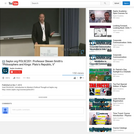
Lecture on Book V of Plato's Republic.
- Subject:
- Arts and Humanities
- Philosophy
- Material Type:
- Lecture
- Provider:
- The Saylor Foundation
- Author:
- Steven Smith
- Date Added:
- 11/07/2013

Lecture on Book V of Plato's Republic.
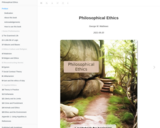
This book is an introduction to philosophical ethics intended for use in introductory college or high school level courses. It has grown out of lecture notes I shared with the first students who took my online Ethics course at the Pennsylvania College of Technology almost 20 years ago. Since then it has seen more development in a variety of forms – starting out as a pdf document, and then evolving into a static set of WordPress pages and finally now as a book written in bookdown and hosted at GitHub. This text represents my attempt to scratch a couple of itches. The first is my wanting a presentation of the major philosophical approaches to ethics that I can actually agree with and that is integrated into my overall teaching method. I tend to teach philosophy to beginners and so there is a fair amount of discussion of the tools used by philosophers and of the ways in which their approach differs from that of their colleagues in other disciplines.

This course provides an introduction to important philosophical questions about the mind, specifically those that are intimately connected with contemporary psychology and neuroscience. Are our concepts innate or are they acquired by experience? And what does it even mean to call a concept ‘innate’? Are ‘mental images’ pictures in the head? Is color in the mind or in the world? Is the mind nothing more than the brain? Can there be a science of consciousness? The course includes guest lectures by philosophers and cognitive scientists.
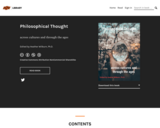
Philosophical Thought: across cultures and through the ages, is an open-educational resource (OER) to be used as a collection of readings for introductory philosophy courses. The objectives for developing and sharing this open resource are three-fold:
1. to provide a collection of philosophical works that can be used as a foundation for faculty and students to use in undergraduate philosophy courses
2. to provide a resource that is free to students
3. to provide a resource that compiles philosophical thought from a variety of cultures and eras
The works included in this book come from a wide range of sources. However, this book is indebted to Henry Imler’s editorial work on Sapienta and Phronesis, both of which are OER texts available on Pressbooks.

Word Count: 362042
(Note: This resource's metadata has been created automatically by reformatting and/or combining the information that the author initially provided as part of a bulk import process.)

Philosophy Ethics Syllabus
PHL 202: Ethics
COURSE DESCRIPTION:
Explores basic problems in moral and social philosophy along with issues related to
human nature, for example: how to define a good life or a good society; what is the
nature of happiness, pleasure, virtue and justice; consequence vs. duty-based
theories; the role of reason and/or passion; and arguments for and against natural
law.
LEARNING OUTCOMES. Students will learn to:
1. Demonstrate understanding of major ethical theories and problems in the
Western Tradition through written and oral discussion.
2. Assess arguments and philosophical perspectives using critical reasoning.
3. Express complex thoughts logically and coherently.
4. Apply knowledge of ethical perspectives, theories, and critical reasoning to
develop his or her own opinions regarding philosophical problems and issues.

This course examines works of film in relation to thematic issues of philosophical importance that also occur in other arts, particularly literature and opera. Emphasis is put on film’s ability to represent and express feeling as well as cognition. Both written and cinematic works by Sturges, Shaw, Cocteau, Hitchcock, Joyce, and Bergman, among others, are considered. There are no tests or quizzes, however students write two major papers on media/philosophical research topics of their choosing.
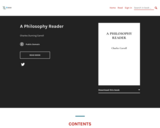
Word Count: 51188
(Note: This resource's metadata has been created automatically by reformatting and/or combining the information that the author initially provided as part of a bulk import process.)

This guide compiles starting points for OER and freely available resources for Philosophy and Religion courses and topics. This OER subject guide was created for TCC faculty and staff and reflects TCC credit, continuing education, and corrections course offerings. The purpose of this guide is to help faculty and staff more easily find and review OER in their areas so that they can make decisions about quality, accuracy, relevancy, and potential use.
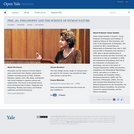
Philosophy and the Science of Human Nature pairs central texts from Western philosophical tradition (including works by Plato, Aristotle, Epictetus, Hobbes, Kant, Mill, Rawls, and Nozick) with recent findings in cognitive science and related fields. The course is structured around three intertwined sets of topics: Happiness and Flourishing; Morality and Justice; and Political Legitimacy and Social Structures.

Word Count: 54231
(Note: This resource's metadata has been created automatically by reformatting and/or combining the information that the author initially provided as part of a bulk import process.)

Word Count: 49803
(Note: This resource's metadata has been created automatically by reformatting and/or combining the information that the author initially provided as part of a bulk import process.)

This course is a seminar on the philosophical analysis of film art, with an emphasis on the ways in which it creates meaning through techniques that define a formal structure. There is a particular focus on aesthetic problems about appearance and reality, literary and visual effects, communication and alienation through film technology.

This course examines fundamental issues in the philosophy of law, including the nature and content of law, its relation to morality, theories of legal interpretation, and the obligation to obey the law, as well as philosophical issues and problems associated with punishment and responsibility, liberty, and legal ethics.

This course explores the nature of love through works of philosophy, literature, film, poetry, and individual experience. It investigates the distinction among eros, philia, and agape. Students discuss ideas of love as a feeling, an action, a species of ‘knowing someone,’ or a way to give or take. Authors studied include Plato, Kant, Buber, D. H. Lawrence, Rumi, and Aristotle.
This course is part of the Concourse program at MIT.

This course is a seminar on the nature of love and sex, approached as topics both in philosophy and in literature. Readings from recent philosophy as well as classic myths of love that occur in works of literature and lend themselves to philosophical analysis.

Quantum mechanics–even in the ordinary, non-relativistic, “particle” formulation that will be the primary focus of this course–has been a staggeringly successful physical theory, surely one of the crowning achievements of 20th century science. It’s also rather bizarre–bizarre enough to lead very intelligent and otherwise sensible people to make such claims as that the universe is perpetually splitting into many copies of itself, that conscious minds have the power to make physical systems “jump” in unpredictable ways, that classical logic stands in need of fundamental revision, and much, much more. In this course, we intelligent and sensible people will attempt to take a sober look at these and other alleged implications of quantum mechanics, as well as certain stubborn problems that continue to trouble its foundations.
Along the way, we will take plenty of time out to discuss philosophical questions about science that quantum mechanics raises in new and interesting ways: e.g., what it means to attribute probabilities to physical events, what the aims of scientific inquiry are (does it aim at something true, or merely at something useful?), what the role of observation is in constructing a scientific theory, what it means to say that there is an “objective” physical world, whether something as basic as logic can be viewed as an empirical discipline, whether there can be meaningful scientific questions whose answers cannot possibly be settled by experiment, and more.

Contained within these slides are a brief background of two philosophers of religion. Direct text evidence, explanantion, and comparison are provided.
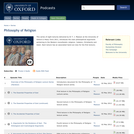
This series of eight audio lectures delivered by Dr T. J. Mawson at the University of Oxford in Hilary Term 2011, introduces the main philosophical arguments pertaining to the Western monotheistic religions: Judaism, Christianity and Islam. Each lecture has an associated hand-out (two for the first lecture).

I have organized this textbook around the way I teach my introductory course in the philosophy of religion. Since I got to design this textbook and it’s for use in my own courses, it directly follows the order in which I teach the topics and each chapter makes up the reading assignment for about 1.5 hours of class time. In other words, I meet with students for thirty 1.5-hour sessions in a semester (hence there are 30 chapters in this work), and for the first meeting, we read and discuss chapter 1, for our second we cover chapter 2, then chapter 3, and so on. It leaves the guess work out of what we cover and when we cover it and keeps things very organized and streamlined. I tell you this now to give you some insight into the way I approach my classroom and time with my students. Since this is intended for an intro-level course, keeping things on track, moving, and organized in this way has proved to be very beneficial for my students.